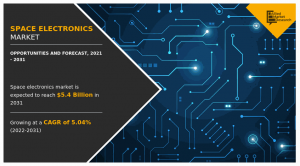Space Electronics Market Size is Expected to Surpass US$ 5.4 billion Through 2031 | Allied Market Research
By component, the microprocessors segment is expected to lead the market during the forecast period.
WILMINGTON, DE, UNITED STATES, January 24, 2025 /EINPresswire.com/ -- According to a new report published by Allied Market Research, titled, “Space Electronics Market," The space electronics market was valued at $3.3 billion in 2021, and is estimated to reach $5.4 billion by 2031, growing at a CAGR of 5.04% from 2022 to 2031.Request The Sample PDF Of This Report: https://www.alliedmarketresearch.com/request-sample/A16421
Asia-Pacific dominated the space electronics market in terms of growth, followed by North America, Europe, and LAMEA. The U.S. dominated the market share in 2021, whereas China is expected to grow at a significant rate in the market during the forecast timeframe.
The space electronics market industry holds a great potential over the coming years backed by an increase in investment by private players such as SpaceX and Amazon, in developed economies. The space electronics market within the developing economies will be moderated by rise in investments by government entities. For instance, in October 2020, the government of India contracted Hughes to establish a satellite-based broadband service, connecting 5,000 remote locations. Such initiatives are supporting space-based operations within the Asia Pacific region and supporting business prospects within the forecast period.
The arrival of NewSpace, which encompasses and focuses on the globally emerging private space flight industry with a major focus to develop quick and affordable access to space is driven by commercial considerations. The NewSpace is having a notable business impact within the space electronics industry. It focuses on the integration of commercial off-the-shelf (COTS) electronic technologies, adoption of open system architectures, standardization across subsystems and components, and exploring novel design possibilities through additive manufacturing. All these initiatives are practiced with performance, affordability, and size, weight, and power consumption (SWaP) concept as the center of effort.
The space electronics market is segmented on the basis of platform, application, type, component, and region. By platform, it is categorized into satellite, launch vehicles, and deep space probes. Depending on the application, it is fragmented into communication, earth observation, navigation, a global positioning system (GPS) & surveillance, technology development, and education, and others. By type, it is divided into radiation hardened and radiation tolerant. The component segment is divided into microprocessors and controllers, sensors, application specific integrated circuits (ASIC), memory chips, power source and cables, discrete semiconductors, and other. Region wise, it is analyzed across North America, Europe, Asia-Pacific, and LAMEA.
LIMITED-TIME OFFER - Buy Now & Get Exclusive Discount on this Report @ https://www.alliedmarketresearch.com/checkout-final/0ea38341b8b0b7647f9454d8a42f29aa
Factors such as an increase in investment in space ventures, rise in launch activities by some of the major private and public players, the establishment of a communication satellite constellation in LEO, and the adoption of space tourism in coming years will augment the business opportunities within the space electronics market. Rise in application of satellites for a range of activities such as surveillance, real-time imaging, communication, navigation, weather forecasting, broadband and connectivity, research, development, and testing, and IoT integration for various government, commercial, and civil-military domains is leading to evolution in the space electronics industry. More than 6,000 satellites were expected to be launched within the timeframe of 2020 to 2027 with rising year-on-year launch rates. The rise in satellite launches has generated demand for various satellite electronics components and other peripheral systems, supporting business opportunities.
KEY FINDINGS OF THE STUDY
By platform, the satellite segment is expected to lead the market during the forecast period.
By application, the communication segment leads the market during the forecast period.
By type, the radiation tolerant segment is expected to grow at lucrative growth rate during the forecast period (2022-2031).
By component, the microprocessors segment is expected to lead the market during the forecast period.
By region, Asia-Pacific is anticipated to exhibit the highest CAGR during the forecast period.
Inquiry Before Buying @ https://www.alliedmarketresearch.com/purchase-enquiry/A16421
Market Key Players
The Key players operating in the space electronics market are BAE Systems, Cobham, Honeywell International Inc., Microsemi Corporation, Texas Instruments, STMicroelectronics, Teledyne e2v (UK) Ltd, TT Electronics, Xilinx Inc., and Ruag Group
Related Reports:
Commercial Satellite Imaging Market
Navigation Lighting Market
Space Robotics Market https://www.alliedmarketresearch.com/space-robotics-market-A07165
Drone Service Market https://www.alliedmarketresearch.com/drone-service-market-A08531
Aircraft Interface Device Market https://www.alliedmarketresearch.com/aircraft-interface-market-A09711
David Correa
Allied Market Research
+1 800-792-5285
email us here
Visit us on social media:
Facebook
X
LinkedIn
YouTube
Legal Disclaimer:
EIN Presswire provides this news content "as is" without warranty of any kind. We do not accept any responsibility or liability for the accuracy, content, images, videos, licenses, completeness, legality, or reliability of the information contained in this article. If you have any complaints or copyright issues related to this article, kindly contact the author above.

